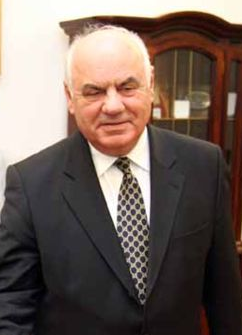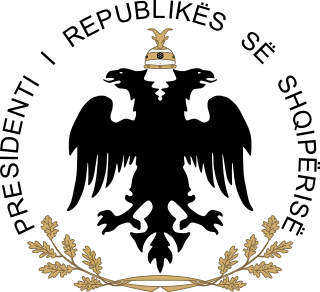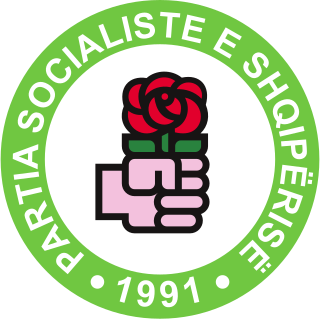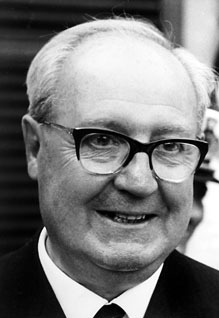
Alfred Spiro Moisiu is a former Albanian military general, diplomat and politician. He was the president of Albania from 2002 to 2007. He is the oldest son of Albanian Army general Spiro Moisiu.

The prime minister of Albania, officially the prime minister of the Republic of Albania, is the head of government of Albania. The office of the prime minister is a core institution in the politics of Albania formed after the Albanian declaration of independence on 28 November 1912. Since that time, the nation has navigated a dynamic political evolution spanning distinct periods, encompassing a monarchy, a communist regime and the eventual democratic order. In 1912, Ismail Qemali was inaugurated as the first prime minister of Albania, guiding the nation toward sovereignty amidst the complex conditions in the Balkans. In 1944, Enver Hoxha implemented a radical change in government, transforming Albania into an authoritarian and isolationist communist regime. In 1991, the nation transitioned into a democracy that marked a notable shift, when Fatos Nano emerged as the first post-communist prime minister of Albania.

The president of Albania, officially styled the President of the Republic of Albania, is the head of state, commander-in-chief of the military and the representative of the unity of the Albanian people.

Edi Rama is an Albanian politician and painter who has been serving as the 33rd and incumbent prime minister of Albania since 2013 and chairman of the Socialist Party of Albania since 2005. He was Minister of Culture, Youth and Sports from 1998 to 2000. First elected mayor of Tirana in 2000, he was reelected in 2003 and 2007.

Fatos Thanas Nano is an Albanian socialist politician who served as Prime Minister of Albania in 1991, from 1997 to 1998 and from 2002 to 2005. He was the first leader and founder of the Socialist Party of Albania and a member of the Albanian Parliament from 1991 to 1993 and 1997 to 2009. He reformed the anti-revisionist Marxist-Leninist ideology of the Labor Party of Albania into social democracy for its successor, the Socialist Party. During his leadership, the Socialist Party, as a result of reforms, joined the Socialist International and Party of European Socialists. Nano was a candidate in the 2007 presidential election but did not win. He again tried in the 2012 presidential election, but he did not even qualify as a candidate, because the leaders of parties in Parliament obstructed their respective MPs to elect him as candidate in the elections.

The Socialist Party of Albania is a social-democratic political party in Albania. It has been described as centre-left. It was founded on 13 June 1991. The PS is an associate of the Party of European Socialists and a member of the Socialist International, and holds pro-European views.

Azem Shpend Hajdari was the leader of the student movement in 1990–1991 that led to the fall of communism in Albania. He then became a politician of the Democratic Party of Albania (DP). He symbolizes the start of the democratic era in Albania. He was a member of the Albanian parliament and the Chairman of the Defence Parliamentary Commission. He was shot to death in Tirana on September 12, 1998 at age 35.
Indirect presidential elections were held in Albania on 20 and 27 June, 8, 11, 14, and 20 July, the sixth such elections since the collapse of the communist regime in 1991.
Indirect presidential elections were held in Albania on 24 June 2002, the fifth such elections since the collapse of the communist regime in 1991. Under pressure from international organization, Alfred Moisiu was chosen by Sali Berisha and Fatos Nano as a consensus candidate for the presidency after the end of Rexhep Meidani's term. Moisiu was found fitting for that post since he was a researcher, was politically neutral, was known as an effective mediator and had a decisive pro-Western and NATO orientation.

Jozefina Topalli is an Albanian politician who formerly served as the Chairwoman of the Parliament of Albania from 2 September 2005 until 9 September 2013. She held the title of vice president of the Democratic Party of Albania. Topalli is married and has two children.
In 1991, the Socialist Party of Albania, with specific social democratic ideology took control of the country through democratic elections. One year later the Democratic Party of Albania won the new elections. After 1990, Albania has been seeking a closer relationship with the West. What followed were deliberate programs of economic and democratic reform, but the implementation of capitalism led to the proliferation of pyramid schemes. Chaos in late 1996 to early 1997, as a result of the collapse of these pyramid schemes, alarmed the world and prompted the influx of international peacekeeping forces. In 1995, Albania was accepted into the Council of Europe and requested membership in NATO and is a potential candidate country for accession to the European Union. The workforce of Albania has continued to emigrate to Western countries, especially Greece and Italy.

Bujar Faik Nishani was an Albanian politician. He served as the president of Albania from 24 July 2012 to 24 July 2017.

Parliamentary elections were held in Albania on 22 March 1992, with a second round of voting for eleven seats on 29 March. The result was a victory for the opposition Democratic Party of Albania, which won 92 of the 140 seats. After the elections Aleksandër Meksi became prime minister and Sali Berisha became president.

The 1964 Italian presidential election was held in Italy from 16 to 28 December 1964, following the resignation of President Antonio Segni on 6 December 1964 due to health problems.
The 2022 Albanian presidential election marked the ninth presidential election held in Albania, taking place from 10 May to 4 June 2022. The election process commenced with the nomination of candidates by the parliament of Albania, necessitating a total of four rounds of voting. The initial three rounds of voting, held on 16, 23, and 30 May, did not result in the election of a president due to an insufficient number of candidates, largely attributed to the internal leadership crisis of the Democratic Party (PD) and the disagreements among the governing parties. On 3 June, the Socialist Party (PS) nominated Bajram Begaj, who was subsequently elected in the fourth round on 4 June.

Presidential elections were held in Montenegro on 15 April 2018. Former Prime Minister Milo Đukanović, leader of the ruling DPS was elected as new President of Montenegro in the first round.

The Twenty-ninth Legislature of Albania, officially known as the VIII Pluralist Legislature of Albania, is the legislature of Albania following the 2013 general election of Members of Parliament (MPs) to the Albanian Parliament. The party of the Prime Minister Edi Rama, PS, with its coalition partners obtained an absolute majority of 83.

The Second Government of the Prime Minister Ilir Meta was the 60th Government of the Republic of Albania which was officially mandated by President Rexhep Meidani on 7 September 2001. After the 2001 election, the alliance led by the Socialist Party won the majority for the second time in a row and managed to create a post–electoral coalition of 86 seats in Parliament to form the new government.

The Majko II Government was the 61st ruling government of the Republic of Albania, led by prime minister Pandeli Majko. It was officially mandated by president Rexhep Meidani on 22 February 2002. After the 2001 parliamentary elections, the alliance led by the Socialist Party won a seat majority for the second consecutive time and managed to form a government headed by Ilir Meta but due to internal conflicts within the party, Meta was forced to offer his resignation on 29 January 2002. Majko managed to persuade most of the party hierarchy, including its chairman Fatos Nano, to form a new government, although as it turned out, for the same reasons as the Meta II Government, he offered his resignation a few months later on 25 July 2002.
The Bufi Government better known as the Government of Stability was an interim government formed after the resignation of the previous Nano government due to the aggravated situation in the country after the events of 2 April 1991 where 4 opposition supporters were killed in Shkodër during a anti-communist protest that led to the burning of the Shkodra Labor Party Committee. The Nano government resigned on 4 June 1991, and the next day the then-President Ramiz Alia, began negotiations to form a comprehensive government whose main objective would be to restore stability to the country, from which it took the name "Stability Government". Ylli Bufi was accepted also by the opposition to be appointed as Prime Minister, while one of the most prominent figures of the Democratic Party, such as Gramoz Pashko, was appointed Deputy Prime Minister.














